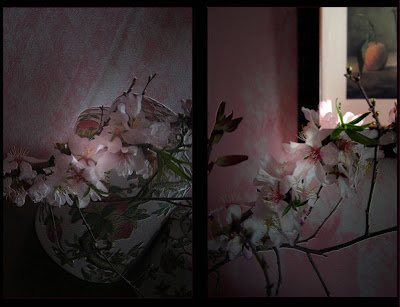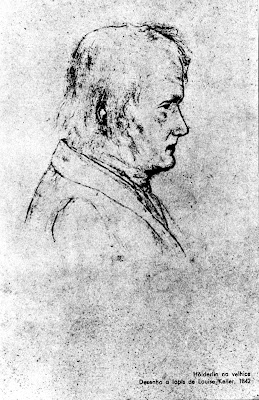Almond blossoms ...
***



***
Compte les amandesCompte les amandes,
compte ce qui était amer et t’a tenu en éveil,
compte-moi au nombre de tout cela :
je cherchais ton œil quand tu l’as ouvert et que personne
ne te regardait,
j’ai tourné ce fil secret
sur lequel la rosée que tu pensais
a glissé en bas jusqu’aux cruches
que protège une formule qui n’a trouvé le cœur de personne.
C’est là-bas seulement que tu es entré tout entier dans le
nom qui est le tien,
que tu as marché d’un pied sûr vers toi-même,
que les marteaux se sont balancés librement dans le beffroi de ton silence,
que le tout juste Entendu est soudain venu jusqu’à toi,
que le déjà-mort t’a aussi entouré de son bras,
et vous êtes allés trois en un dans le soir.
Rends-moi amer.
Compte-moi au nombre des amandes.
Paul Celan, Choix de Poèmes, traduction Jean-Pierre Lefebvre
(Paris, Editions Gallimard, 1998), p.79.
***
Count the Almonds
Count the almonds,
count what was bitter and kept you awake,
count me in:
I looked for your eye when you opened it, no one was looking at you,
I spun that secret thread
on which the dew you were thinking
slid down to the jugs
guarded by words that to no one's heart found their way.
Only there did you wholly enter the name that is yours,
sure-footed stepped into yourself,
freely the hammers swung in the bell-frame of your silence,
the listened-for reached you,
what is dead put its arm round you also
and the three of you walked through the evening.
Make me bitter.
Count me among the almonds.
Translation: Michael Hamburger
***
Count up the almondsCount up the almonds,
count what was bitter and kept you waking,
count me in too:
I sought your eye when you looked out and no one saw you,
I spun that secret thread
where the dew you mused on
slid down to pitchers
tended by a word that reached no one's heart.
There you first fully entered the name that is yours,
you stepped toward yourself on steady feet,
the hammers swung free in the belfry of your silence,
things overheard thrust through to you,
what's dead put its arm around you too,
and the three of you walked through the evening.
Render me bitter.
Number me among the almonds.
Translation:John Felstiner
***
Zähle die Mandeln
Zähle die Mandeln,
zähle, was bitter war und dich wachhielt,
zähl mich dazu:
Ich suchte dein Aug, als du’s aufschlugst und niemand dich ansah,
ich spann jenen heimlichen Faden,
an dem der Tau, den du dachtest,
hinunterglitt zu den Krügen,
die ein Spruch, der zu niemandes Herz fand, behütet.
Dort erst tratest du ganz in den Namen, der dein ist,
schrittest du sicheren Fußes zu dir,
schwangen die Hämmer frei im Glockenstuhl deines Schweigens,
stieß das Erlauschte zu dir,
legte das Tote den Arm auch um dich,
und ihr ginget selbdritt durch den Abend.
Mache mich bitter.
Zähle mich zu den Mandeln.
Paul Celan, op.cit. 78
***
An interesting interpretation on Celan's Poetry.
***
The theme of the almond tree has a special importance in Celan’s poetry. Besides its evocative power (e.g. the image of flowering almond trees in spring), it had in fact a complex net of meanings. The first reference is to Josip Mandelstam’s poetry, which had a deep artistic influence on Paul Celan: the Russian poet’s family name has a German origin, and means “almond stem” (and, by extension, “the almond’s lineage”). A more dramatic significance is present as well: in gas-chambers, where Jews like Celan’s parents were exterminated, people were killed through inhalation of Zyklon-B, a lethal gas that was prepared also with almonds. Finally, the shape of almonds reminds us of eyes (reference to sight, vision, expression etc.), and it was commonly used in some Byzantine and Russian icons. Consequently, allusion to almonds implies a whole world of mental connections: the sense of poetry,22 discovered by Celan through Mandelstam; the problem of Jewish identity;23 the drama of “God’s death”, experienced through the tragedy of Shoah (Zyklon-B).
From:Chiara Bertoglio,"Giya Kancheli’s Exil: the spirituality of motifs."
***

***
Rebecca Steltner, in her original essay, Paul Celans 'Zahle Die Mandeln' , a Critical Commentary (1), refutes the interpretations of the poem, quoted above, arguing that in this poem Celan defines his relationship with the reader. According to Steltner he express his intentions and also explicitly states how he wants to be read.
(1)Rebecca Steltner , Paul Celans "Zahle Die Mandeln", a Critical Commentary,( Grin Verlag, 2007).
For me, in this poem - as it happens in many other Celan's poems - he addresses especially his most "engaged reader":Ingeborg Bachmann ...


Comentários